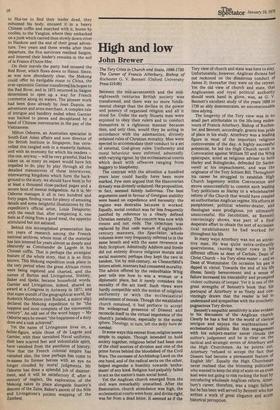High and low
John Brewer
The Tory Crisis in Church and State, 1688-1730 The Career of Francis Atterbury, Bishop of Rochester G. V. Bennett (Oxford University Press 00.00)
Between the mid-seventeenth and the mideighteenth centuries British society was transformed, and there was no more fundamental change than the decline in the power and potency of organised religion and all it stood for. Under the early Stuarts men were enjoined to obey their rulers and to conduct themselves in a righteous manner because then, and only then, would they be acting in accordance with the adamantine, divinely ordained rules of Christian morality. Men were epected to accommodate their conduct to a set of external, God-given rules. Uniformity and moral behaviour were enforced, admittedly with varying rigour, by the ecclesiastical courts which dealt with offences ranging from buggery to blasphemy.
The contrast with the situation a hundred years later could hardly have been more marked. Few men argued that the Hanoverian dynasty was divinely ordained; the proposition, in fact, seemed faintly ludicrous. The best arguments used in favour of Georgian stability were based on expedience. and necessity: the regime was desirable because it worked. Equally, social conduct was far less frequently justified by reference to a clearly defined Christian morality. The concern was now with means and not ends. The catechism was replaced by that vade mecum of eighteenthcentury manners, the Spectator, whose volumes were very frequently referred to in the same breath and with the same reverence as Holy Scripture. Admittedly Addison and Steele did not entirely divorce religious morals and social manners; perhaps they kept the two in tandem. Yet by mid-century, as Chesterfield's letters attest, manners had consumed morality. The advice offered by the redoubtable Whig peer tells one how to win a woman or a diplomatic place, but it rarely considers the morality of the act itself. Such views were hardly compatible with the notion of religious uniformity or with the ecclesiastical enforcement of morals. Though the established church remained, it had perforce to accept the widespread presence of Dissent and reconcile itself to the virtual impotence of the church's jurisdiction, especially in the moral sphere. Theology, in turn, left the deity hors de combat.
In some ways this retreat from religion seems simple to explain. Though intended to hold society together, religious belief had been one of the chief sources of division and one of the prime forces behind the bloodshed of the Civil Wars. The excesses of Archbishop Laud on the one hand, and of the radical sects on the other, helped engender a hostility towards 'enthusiasm' of any kind. Religion had palpably failed to act as the nation's Main social bond.
Yet the Anglican church emerged from the civil wars remarkably unscathed. After the Restoration, church attendance was high, the ecclesiastical courts were busy, and divine right. was far from a dead letter. It seemed as if the Tory view of church and state was here to stay. Unfortunately, however, Anglican divines had not reckoned on the disastrous conduct of James II; thereafter they were on the retreat. Yet the old view of church and state, that Anglicanism and royal political authority should work hand in glove, was, as G. V. Bennett's excellent study of the years 1688 to 1730 so ably demonstrates, an unconscionable time adying.
The longevity of the Tory view was in no small part attributable to the life-long endeavours of Francis Atterbury, Bishop of Rochester, and Bennett, accordingly, grants him pride of place in his study. Atterbury was a leading figure in most of the important religious controversies of the day. A highly successful polemicist, he led the High Church revolt in Convocation against William III and the Whig episcopate, acted as religious adviser to both Harley and Bolingbroke, defended Dr Sacheverell at his impeachment, and was the originator of the Tory Schism Bill. Throughout his career he struggled to establish High Church hegemony within Convocation and strove unsuccessfully to commit such leading Tory politicians as Harley to a wholehearted reform of the Church that would have created an authoritarian Anglican regime. His efforts as pamphleteer, political wheeler-dealer, and theologian were prodigious, yet ultimately unsuccessful. His Jacobitism, as Bennett convincingly shows, was part of a final desperate effort to obtain the sort of ecclesiastical establishment he had worked for throughout his life.
In many ways Atterbury was not an attractive man. He was quite extra-ordinarily quarrelsome, causing major rows in his different offices as dean of Carlisle, Dean of Christ Church — his Tory alma mater — and as Dean of Westminster. On occasion his pen is dipped in vitriol. Towards the end of his life illness, family bereavement and a sense of failure increased his irascability and prompted violent outbursts of temper. Yet it is one of the great strengths of Bennett's book that his portrayal of Atterbury is so finely and convincingly drawn that the reader is led to understand and sympathise with the crotchety, pugnacious Tory divine. • Bennett's empathic sensitivity is also evident in his discussion of the Anglican church. Clearly he has a feel for the world of clerical intrigue and enjoys the machinations Of ecclesiastical politics. But this engagement with his subject-matter never clouds the author's judgement and he is clear on the tactical and strategic errors of Atterbury and the High Churchmen. As he points out, Atterbury "refused to accept the fact that Dissent had become a permanent feature of English life". Equally the High Churchman never realised that the trimming politicians who wanted to keep the ship of state on an even keel were not going to risk rocking the boat by introducing wholesale Anglican reform. Atterbury's career, therefore, was a tragic failure, but he has been well served by Bennett who has written a work of great elegance and acute historical perception.


























 Previous page
Previous page